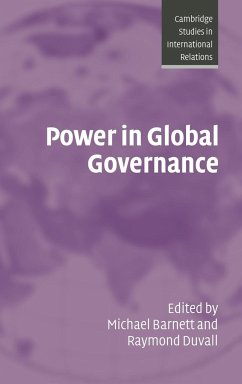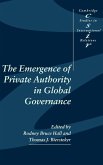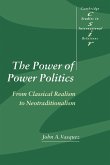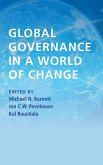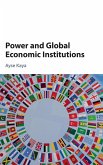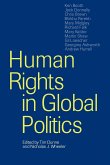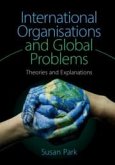Short description/annotation
This edited volume gathers together international scholars to reconsider the conceptualization of power in world politics.
Main description
This edited volume examines power in its different dimensions in global governance. Scholars tend to underestimate the importance of power in international relations because of a failure to see its multiple forms. To expand the conceptual aperture, this book presents and employs a taxonomy that alerts scholars to the different kinds of power that are present in world politics. A team of international scholars demonstrate how these different forms connect and intersect in global governance in a range of different issue areas. Bringing together a variety of theoretical perspectives, this volume invites scholars to reconsider their conceptualization of power in world politics and how such a move can enliven and enrich their understanding of global governance.
Table of contents:
1. Power and global governance Michael N. Barnett and Raymond Duvall; 2. Power, institutions, and the production of inequality Andrew Hurrell; 3. Policing and global governance Mark Laffey and Jutta Weldes; 4. Power, fairness and the global economy Ethan Kapstein; 5. Power politics and the institutionalization of international relations Lloyd Gruber; 6. Power, nested governance, and the WTO: a comparative institutional approach Greg Shaffer; 7. The power of liberal international organizations Michael N. Barnett and Martha Finnemore; 8. The power of interpretive communities Ian Johnstone; 9. Class powers and the politics of global governance Mark Rupert; 10. Global civil society and global governmentality: or, the search for the political and the state amidst capillaries of power Ronnie Lipschutz; 11. Governing the innocent(?)33; The 'civilian' in international law Helen Kinsella; 12. Colonial and postcolonial global governance Himadeep Muppidi; 13. Knowledge in power: the epistemic construction of global governance Emanuel Adler and Steven Bernstein.
Hinweis: Dieser Artikel kann nur an eine deutsche Lieferadresse ausgeliefert werden.
This edited volume gathers together international scholars to reconsider the conceptualization of power in world politics.
Main description
This edited volume examines power in its different dimensions in global governance. Scholars tend to underestimate the importance of power in international relations because of a failure to see its multiple forms. To expand the conceptual aperture, this book presents and employs a taxonomy that alerts scholars to the different kinds of power that are present in world politics. A team of international scholars demonstrate how these different forms connect and intersect in global governance in a range of different issue areas. Bringing together a variety of theoretical perspectives, this volume invites scholars to reconsider their conceptualization of power in world politics and how such a move can enliven and enrich their understanding of global governance.
Table of contents:
1. Power and global governance Michael N. Barnett and Raymond Duvall; 2. Power, institutions, and the production of inequality Andrew Hurrell; 3. Policing and global governance Mark Laffey and Jutta Weldes; 4. Power, fairness and the global economy Ethan Kapstein; 5. Power politics and the institutionalization of international relations Lloyd Gruber; 6. Power, nested governance, and the WTO: a comparative institutional approach Greg Shaffer; 7. The power of liberal international organizations Michael N. Barnett and Martha Finnemore; 8. The power of interpretive communities Ian Johnstone; 9. Class powers and the politics of global governance Mark Rupert; 10. Global civil society and global governmentality: or, the search for the political and the state amidst capillaries of power Ronnie Lipschutz; 11. Governing the innocent(?)33; The 'civilian' in international law Helen Kinsella; 12. Colonial and postcolonial global governance Himadeep Muppidi; 13. Knowledge in power: the epistemic construction of global governance Emanuel Adler and Steven Bernstein.
Hinweis: Dieser Artikel kann nur an eine deutsche Lieferadresse ausgeliefert werden.

